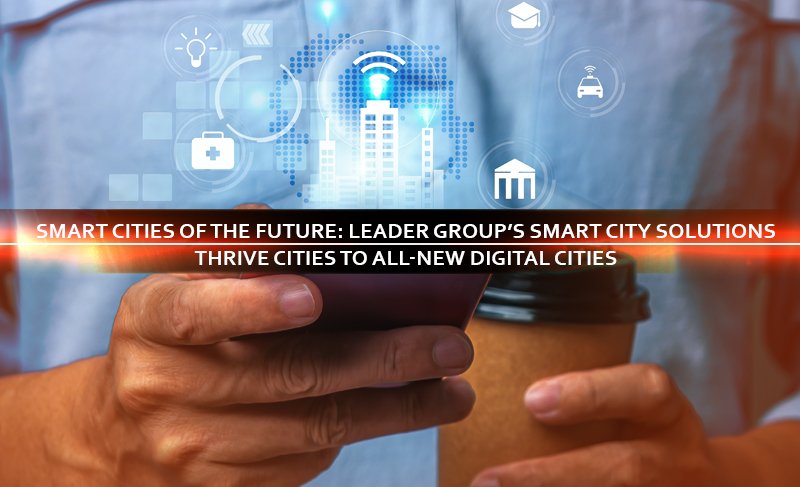
Smart Cities of the future: Leader Group’s Smart City solutions thrive cities to all-new digital cities
“Smart Cities are a reality now. It not only uses connected devices and sensors to add value to citizens’ lives but also creates an efficient, sustainable, and enriching living experience for the communities. Leader Group’s Smart Cities solutions enable municipalities and organizations to attain a smart future of cities by embedding a smart living experience.”
Cities’ quality determines the quality of human life, identifies the global ease of living indices, and adds value to an individual’s and communities’ living standards, providing what exactly is needed for a sustainable, efficient, and resilient human living standard.
That’s where the concept of smart cities becomes more enriching and surges to an-all new standardized approach that caters not only to companies but an overall strategic version of adding to a global human experience to its entire stakeholders and communities in digitally driven ways.
Smart cities encapsulate several business nuances, consisting of strategic, ecological, and digital parameters that allow businesses to achieve their goals and objectives and thrive in the long run.
Government bodies and municipalities invest in innovative city projects venturing with corporates and institutions to carry out the required operations, programs, and processes, all in digitized ways to put forward the sustainable, smart, and resilient league of business practices that add value, growth, and sustainable to the city.
According to recent research, the global market value of smart cities will reach USD 870 Billion by 2026.
Factors such as growing urbanization, need for efficient management and utilization of resources, demand for fast and efficient transport, public safety concerns, and increasing demand for a healthy environment contribute to the growth of the smart city market.
Furthermore, the need for sustainability and digitized businesses are also propelling the market growth of global smart cities.
Government bodies, municipalities, and corporates come together to deliver strategic planning and digital tools to drive innovation, technology, and digital communication amongst the communities to drive Smart cities projects efficiently.
Elements of Smart City
Smart cities are not just another concept but a reality that has reached the pinnacle of digitizing the living standards of many populations.
It is not just the digital tools and technologies that are in tandem with business processes but also how smart city projects are carried out.
1.Reducing the Carbon Emissions
As digitization, and digitized business processes increase, the rise in urbanization, industrialization, and consumption of goods and services grow, resulting in environmental pressures multiplying them gradually.
Smart cities utilize connected sensors and technology in various applications, such as building-automation systems, dynamic electricity pricing, and some mobility applications, to reduce carbon emissions by 10 to 15 percent.
2.Smart Applications
Smart cities allow citizens and communities to leverage the power of digital data, tools, and technologies by implementing the smart applications of IoT-based sensors.
Smart cities utilize intelligence tools, adding them to existing urban systems, enabling municipalities and organizations to do more with less.
These connected, innovative applications put real-time, transparent information into the hands of users to help them make better choices enhancing productivity, promoting resilience., and driving growth.
3.Managing Traffic
Congestion caused by the rising traffics remains one of the addressable issues for cities, and it becomes an obstacle in attaining a smart city.
Organizations and municipalities utilize private-sector e-hailing with an option of bike and car-sharing applications.
This helps cities in two ways; while it manages the traffic, it also eases the issue of air pollution by adopting predictive maintenance of public transit or congestion pricing models.
Furthermore, managing waste in digital ways, establishing smart water management, and creating sustainable drainage systems in the cities remains the foremost priority for the companies leading to a smart city.
Not only this, but government organizations also allocate budgets for smart cities with modest urban planning initiatives and activities, leading to a smart city.
Also, the rise in software integrations and third-party applications eases the smart city infrastructure and drives digitization across the entire value chain of smart city projects.
Leader Group is one such organization that delivers robust, hassle-free, and digitized Smart city solutions to organizations and municipalities., enabling them to drive smart city projects with utmost efficiency.
Conclusion
Smart Cities are now a reality.
With the change in governance models and surge in the significance of maintaining cities sustainably, municipalities, organizations, and communities are delivering efficient, resilient, and sustainable cities to add value to citizens’ lives.
The set targets of net zero emissions by organizations, socio-economic measures, and robust growth parameters enable organizations to leverage digitization’s benefits and transform cities into smart cities.





